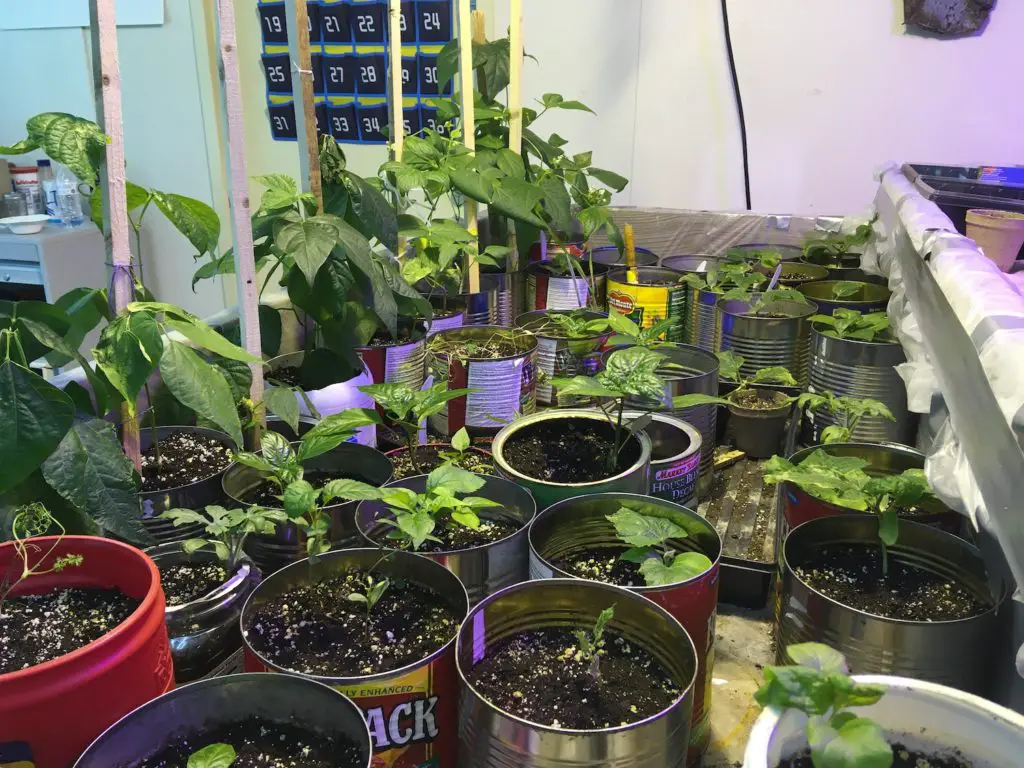If you’ve been hunting around wondering where to buy cheap vegetable seeds or plants, I’m here to help. I consistently fill my side yard garden for less than $30 a year and love to share all the places I find them.
You see, my goal is to garden as inexpensively as possible. I’ve already covered how to put in garden beds for free (or nearly free). I’ve also talked about how to make free compost to use instead of expensive fertilizer. Now, it’s time to talk about where to get your seeds and plants!
Buy Heirlooms & Save the Seeds
If you’re willing to buy slightly more expensive seeds this year, you’ll have free seeds every year after. (And even then, heirloom seeds aren’t that much more expensive than conventional.)
Heirloom means the seed you plant produces a fruit or vegetable with seeds identical to the one you planted. So it’s basically an infinite seed machine.
When I want to buy heirloom seeds, I usually check one of the following retailers:
- Burpee– Some people don’t think of Burpee as having heirloom seeds, but they do! My favorites (and the ones I’m planting this year) are the Danvers carrots.
- Walmart– Believe it or not, I’ve had luck buying Walmart seeds and saving them for next year. The benefit, of course, is that practically everyone lives close to a Walmart if they can’t wait for an online order to arrive.
- Eden Brothers– They have a HUGE variety of heirlooms, much larger than most online sellers. They also focus on heirloom flowers, which I don’t see as often.
- Baker’s Creek– These guys produce such high quality seeds, I frequently give and receive their seeds as presents.
- Fedco Seeds– Finally, my absolute favorite seed seller. They’re local to me in Maine, and I haven’t had a bad experience in nearly 10 years of buying. Unfortunately, they’re not the cheapest around.
Seed and Plant Swaps
Another route is to find seed or plant swaps. You won’t be as guaranteed to get quality plants, but they’ll definitely be cheap! The concept is simple: you offer your extra seeds or plants, and exchange them for others you need. This way, no seeds go to waste.
There’s the online site PlantSwap.org, where you can do this virtually. Generally, the receiver pays shipping for items.
I’m also a member of several local gardening groups on Facebook and see these types of swaps advertised regularly. Gardeners tend to be a very generous bunch too, so even if you’re not finding any swaps, you could start your own and have everyone come to you.

Seed Libraries
There are hundreds of seed libraries all across the United States. Some are associated with actual libraries, others are connected to garden clubs or food banks. You’ll have to check the local rules and regulations of yours, but many offer seeds for free to anyone who wants them. Some might require you donate some of the seeds you harvest in the fall to keep the plant in circulation.
Fundraiser Plant Sales
When April or May rolls around (depending on your climate), keep an eye out for local plant sales. Your local Master Gardener organization will probably have one, as will a lot of churches, civic organizations, and schools. These are often great places to get hearty seedlings, plus you know your money is going to a good organization. For the best deals, consider going at the end of the day when everything else has been picked over. (Though you might need a little skill to bring things back to life!)
Farmer’s Markets
Because the agriculture business is lots of work, depends heavily on the weather, and requires lots of overhead, their products are likely to be more expensive. However, there are exceptions for unpopular plants.
You’ll find some of the highest quality products at a local nursery, farm, or farmer’s market. These guys know their stuff, grow veggies for a living, and they likely live and give locally. Generally, they’ve survived because they’re good at what they do and sell quality products. This is unlike other big box stores where I’ve found the seedlings are often weak and die easily.
Even if you can’t find cheap vegetable seeds plants at the farmer’s markets, the farmers are often willing to share knowledge. For instance, they might know a local farm that donates seedlings every year to needy families. (This is a new initiative my master gardener chapter just started.) You’ll never know until you ask!
Phone a Friend
By far, the cheapest method of getting plants is to find a gardening BFF. Look for the kind of person who gets overexcited and doesn’t have enough room for all their seedlings. You can generally find such people in gardening clubs, at botanical gardens, farmer’s markets, volunteering at nursing homes, and shopping at local nurseries. You might also find them in your neighborhood, bent over their begonias on the weekends. Complement them, ask them questions, and strike up a casual friendship. Once you actually know them, mention you might have space in your own beds if they have anything they no longer have room for. Thrown in an offer for free weeding help and you might have a lifetime plant supplier.
I hope this gave you some places to find cheap vegetable seeds and plants. If you want to get more money-saving tips in your inbox, subscribe to my newsletter below!
